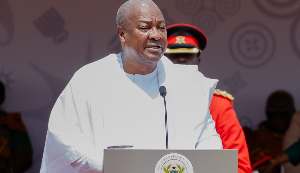Obesity has become a global epidemic, affecting millions of people worldwide and posing significant health risks.
In recent years, developing countries like Ghana have witnessed a rapid increase in obesity rates, signaling a concerning trend that demands urgent attention. Kingsley Agyemang, Registrar of the Ghana Scholarship Secretariat and philanthropist who is leading the developmental course of Abuakwa South Constituency sheds light on the issue of obesity through his groundbreaking PhD thesis, revealing some grim findings that highlight the gravity of the obesity problem in Ghana.
Over the past years, Dr. Agyemang has been leading a number of healthful initiatives to change the lives of the people of Abuakwa South Constituency. He is often seen in the company of party stalwarts in ‘health walks’ and ‘keep-fit’ activities. Perhaps 1Tim 4:8 is on his mind, too.
He has registered over 10,000 people (of the constituency) onto the National Health Insurance scheme, with his own financial resources. I now understand why he is so particular about health and lifestyle-related issues.
After all, he is a Public Health activist and he will be the next MP so he wants his constituents to be healthy! Very good, is it not?
Dr. Agyemang’s research, conducted over several years, aimed to explore the determinants and consequences of obesity in Ghanaian society. His findings underscore the need for comprehensive measures to address this escalating public health crisis.
One of the key revelations from his research is the strong influence of changing lifestyle patterns on obesity rates in Ghana. As the country undergoes rapid urbanization and modernization, traditional diets (banku, kakro, fufu, ampesi, kontomire, yaka yaka, nkyewee, brobe, turkey berries, etc.) are being replaced by unhealthy, high-calorie, and processed foods. I am from the village so these traditional foods were common to me, growing up in Kyebi-Apapam.
The consumption of sugary beverages, fast food, and snacks has risen exponentially, leading to an increase in caloric intake and a decline in physical activity levels. On TV3 yesterday (June 25, 2023), people shared how they struggle to lose body weight through exercise. 56% of respondents to a small survey intimated “They know exercise is good but we can’t do it.”
These changes, combined with sedentary lifestyles, contribute significantly to the obesity epidemic. I am guilty of sedentary living. Daily sitting of over 10 hours, from being in a car to full concentration in the office for 8 hours, my life is boxed in this regular ritual!
The research highlights the disparities in obesity prevalence between urban and rural areas in Ghana. While urban centers exhibit higher obesity rates due to the availability of unhealthy food options and reduced physical activity opportunities, rural regions are not immune to the problem.
Factors such as limited access to nutritious foods, lack of awareness about healthy eating habits, and the prevalence of misconceptions about body weight contribute to the rising obesity rates in rural communities.
Obesity is a significant risk factor for various non-communicable diseases (NCDs), including type 2 diabetes, cardiovascular diseases, and certain types of cancers. Ghana already faces a burden of NCDs, and the escalating obesity rates exacerbate the situation. The healthcare system in Ghana is ill-equipped to handle the increasing prevalence of these chronic conditions, further straining limited resources and impeding progress in public health.
I must commend the Ghana Health Service and the Ministry of Health for policy proposals to reduce the burden of NCDs to the barest minimum to alleviate its socio-economic impact. According to Kenkhuis, 2016 and the Ministry of Health, 2012 (cited by Agyemang, 2022), the two policies are the National Nutrition Policy for Ghana and the National Policy for the Prevention and Control of Chronic Non-Communicable Diseases (NCDs) in Ghana.
Dr. Kingsley Agyemang's research also emphasizes the social and economic implications of obesity in Ghana. Obese individuals often face discrimination, stigmatization, and mental health challenges, leading to reduced self-esteem and diminished quality of life. Additionally, the economic burden of obesity is significant, both at the individual and societal levels. Increased healthcare costs, lost productivity, and reduced workforce participation all contribute to the economic strain caused by obesity.
To combat the obesity crisis in Ghana, the researcher’s thesis proposes a multifaceted approach. Firstly, there is a need for public health campaigns that promote awareness about healthy eating habits and the importance of regular physical activity. These campaigns should target both urban and rural communities and leverage traditional and digital media platforms to reach a wider audience.
Secondly, efforts should be made to improve the food environment in Ghana. This includes increasing access to affordable, nutritious foods and reducing the availability and marketing of unhealthy food options. Collaborations with the food industry, policy changes, and the implementation of food labeling regulations can all contribute to creating a healthier food landscape.
Furthermore, he highlights the significance of education, particularly in schools, to instill healthy habits from an early age. Incorporating nutrition and physical education into the curriculum can help shape a generation that values healthy lifestyles.
Finally, the research underscores the importance of a comprehensive healthcare approach to address obesity. This includes training healthcare professionals to recognize and manage obesity effectively, establishing specialized obesity clinics, and integrating obesity prevention and management into primary healthcare services.
The findings indicate that obesity is determined by religion, ethnicity, physical activity & diet, and the local food environment. For instance, Gas and Muslims are more likely to be obese (pp. 155). These determinants could be mitigated by a trade-off between awareness campaigns and economic regulations, like taxation and food subsidies.
He went on to urge the government of Ghana and other relevant agencies, as a recommendation, to factor in these determinants and interventions when reviewing and implementing obesity policies in Ghana.
Opinions of Tuesday, 27 June 2023
Columnist: Gideon Aboagye















